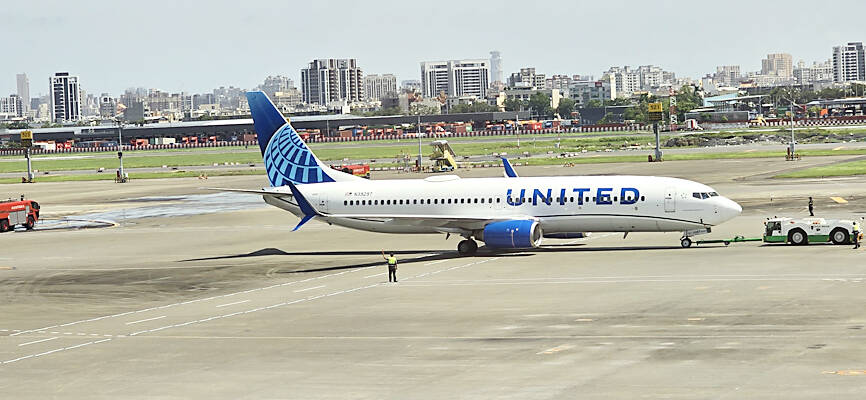A United Airlines (UA) flight on Saturday made its maiden voyage from Kaohsiung International Airport to Narita International Airport near Tokyo, on a new route launched by the major US carrier.
UA838 took off from Kaohsiung at 10:23am, two minutes ahead of schedule, the airline said, adding that the daily route would be operated with a Boeing 737-800.
On Friday, UA837 carried passengers from Narita to Kaohsiung at 8:48pm for the first time.

Photo courtesy of the Kaohsiung City Government
The daily flight to Narita has 166 seats available, including 16 business class seats.
With the daily route, United Airlines officially became the first US carrier to establish regular service out of Kaohsiung, the Kaohsiung City Government said.
The route connects Kaohsiung, Tokyo and San Francisco, it added.
Kaohsiung Mayor Chen Chi-mai (陳其邁), United Airlines’ managing director of worldwide sales Marcel Fuchs and American Institute in Taiwan Kaohsiung branch head Neil Gibson attended an event to commemorate the flight at Kaohsiung airport.
Chen praised the new route for making it easier for city residents to fly to the US, as Narita is a hub for connecting flights to major US cities.
Prior to the new route, people living in Kaohsiung who wanted to fly to the US had to travel north to depart from Taiwan Taoyuan International Airport, but with the United Airlines flights, they have another option for traveling to Tokyo, he said.
Fuchs said the route is expected to greatly benefit tourism, as it not only makes it easier for Japanese tourists to fly to Kaohsiung, but also for Kaohsiung travelers to easily transfer to the US.

The manufacture of the remaining 28 M1A2T Abrams tanks Taiwan purchased from the US has recently been completed, and they are expected to be delivered within the next one to two months, a source said yesterday. The Ministry of National Defense is arranging cargo ships to transport the tanks to Taiwan as soon as possible, said the source, who is familiar with the matter. The estimated arrival time ranges from late this month to early next month, the source said. The 28 Abrams tanks make up the third and final batch of a total of 108 tanks, valued at about NT$40.5 billion

Two Taiwanese prosecutors were questioned by Chinese security personnel at their hotel during a trip to China’s Henan Province this month, the Mainland Affairs Council (MAC) said yesterday. The officers had personal information on the prosecutors, including “when they were assigned to their posts, their work locations and job titles,” MAC Deputy Minister and spokesman Liang Wen-chieh (梁文傑) said. On top of asking about their agencies and positions, the officers also questioned the prosecutors about the Cross-Strait Joint Crime-Fighting and Judicial Mutual Assistance Agreement, a pact that serves as the framework for Taiwan-China cooperation on combating crime and providing judicial assistance, Liang

A group from the Taiwanese Designers in Australia association yesterday represented Taiwan at the Midsumma Pride March in Melbourne. The march, held in the St. Kilda suburb, is the city’s largest LGBTQIA+ parade and the flagship event of the annual Midsumma Festival. It attracted more than 45,000 spectators who supported the 400 groups and 10,000 marchers that participated this year, the association said. Taiwanese Designers said they organized a team to march for Taiwan this year, joining politicians, government agencies, professionals and community organizations in showing support for LGBTQIA+ people and diverse communities. As the first country in Asia to legalize same-sex

MOTIVES QUESTIONED The PLA considers Xi’s policies toward Taiwan to be driven by personal considerations rather than military assessment, the Epoch Times reports Chinese President Xi Jinping’s (習近平) latest purge of the Chinese People’s Liberation Army (PLA) leadership might have been prompted by the military’s opposition to plans of invading Taiwan, the Epoch Times said. The Chinese military opposes waging war against Taiwan by a large consensus, putting it at odds with Xi’s vision, the Falun Gong-affiliated daily said in a report on Thursday, citing anonymous sources with insight into the PLA’s inner workings. The opposition is not the opinion of a few generals, but a widely shared view among the PLA cadre, the Epoch Times cited them as saying. “Chinese forces know full well that